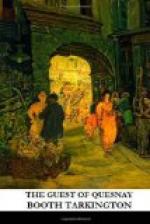Upon the occasion of our forest meeting Mr. Percy had signified his desire to hear some talk of Art. I think he had his fill to-night—and more; for that was the subject chosen by my dashing companion, and vivaciously exploited until our awaited hour was at hand. Heaven knows what nonsense I prattled, I do not; I do not think I knew at the time. I talked mechanically, trying hard not to betray my increasing excitement.
Under cover of this traduction of the Muse I served, I kept going over and over the details of Louise Harman’s plan, as the girl beside me had outlined it, bending above the smudgy sketch-book. “To make them think the flight is for Paris,” she had urged, “to Paris by way of Lisieux. To make that man yonder believe that it is toward Lisieux, while they turn at the crossroads, and drive across the country to Trouville for the morning boat to Havre.”
It was simple; that was its great virtue. If they were well started, they were safe; and well started meant only that Larrabee Harman should leave the inn without an alarm, for an alarm sounded too soon meant “racing and chasing on Canoby Lea,” before they could get out of the immediate neighbourhood. But with two hours’ start, and the pursuit spending most of its energy in the wrong direction—that is, toward Lisieux and Paris—they would be on the deck of the French-Canadian liner to-morrow noon, sailing out of the harbour of Le Havre, with nothing but the Atlantic Ocean between them and the St. Lawrence.
I thought of the woman who dared this flight for her lover, of the woman who came full-armed between him and the world, a Valkyr winging down to bear him away to a heaven she would make for him herself. Gentle as she was, there must have been a Valkyr in her somewhere, or she could not attempt this. She swept in, not only between him and the world, but between him and the destroying demons his own sins had raised to beset him. There, I thought, was a whole love; or there she was not only wife but mother to him.
And I remembered the dream of her I had before I ever saw her, on that first night after I came down to Normandy, when Amedee’s talk of “Madame d’Armand” had brought her into my thoughts. I remembered that I had dreamed of finding her statue, but it was veiled and I could not uncover it. And to-night it seemed to me that the veil had lifted, and the statue was a figure of Mercy in the beautiful likeness of Louise Harman. Then Keredec was wrong, optimist as he was, since a will such as hers could save him she loved, even from his own acts.




